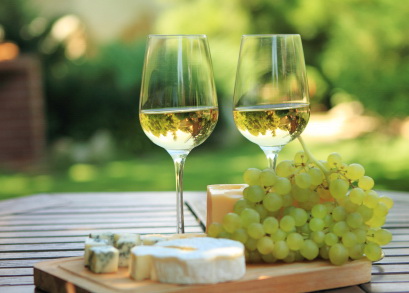
 Few things go together as naturally, simply and deliciously as wine and cheese. The question is, what kind of wine? And what kind of cheese? Pairing the two is more complex than you might think.
Few things go together as naturally, simply and deliciously as wine and cheese. The question is, what kind of wine? And what kind of cheese? Pairing the two is more complex than you might think.
“No rules apply because we all taste things differently,” says Alice Spurrell, owner of Les Amis du Fromage cheese shops in Vancouver as well as the cheese-themed restaurant Au Petit Chavignol.
“The best thing is to be adventurous and just try a cheese with a wine. You want a good taste in your mouth. And the only way to discover that is to put them in your mouth together.”
There are some classic pairings that always work, like Stilton with Port. Then again, Spurrell says, “We used to pair cheese with red wine, but now we know that most cheese goes with white wine.”
So where does a wine-and-cheese-lover start? With the basics, of course.
Wine and cheese, it seems, have a lot more in common than just a shared place near the end of the meal.
“Wine and cheese both ferment, from natural yeast or bacteria, respectively,” says Natalie MacLean, editor of the food-and-wine website www.nataliemaclean.com.
“They both result in controlled decomposition, which may not sound appetizing, but it all results in an amazing range of flavours in both products.”
In addition, both wine and cheese makers are returning to the organic production techniques they followed for millennia before the advent of chemically assisted farming. So when it comes to cheese and organic wine, she says, “I would think that would be a good pairing.”
Other pairings aren’t so obvious: There are so many varieties of both, with an equally broad range of flavours.
There are hundreds, if not thousands of different cheeses, ranging from the mildest mozzarella to pungent Epoisse, buttery triple-cream brie, nutty Manchego, sharp cheddar and tangy blue-veined Stilton.
“There’s so much variety, even though it comes from the same ingredients,” says Spurrell. “It’s a whole little world that’s wonderfully tasty.”
“Mild cheeses — like goat cheese and fresh mozzarella — are among the easiest to match,” MacLean advises.
“They have the lightest flavours so they’re not going to compete with the wine. They go beautifully with a light, crisp, white wine like a Sauvignon Blanc, Pinot Grigio or Riesling.”
As for pairing red wines, which we once thought went so well with cheese, that’s a bit more tricky. The most important thing is to watch the balance: big, bold reds can overpower lighter cheeses, while light-bodied reds can disappear against a powerful fromage — a fortified wine like Port, sherry or Madeira might actually be a better choice.
Here are just a few perfect pairings:
– Triple-creme brie: Lusciously fruity whites or reds, like Chardonnay or Bordeaux, as well as bubbles, pair well with this buttery-rich cheese.
– Stilton and other blue cheeses: Port is the classic match for strong blue cheese, while milder blues go nicely with fruit-forward reds.
– Chevre: Crisp, aromatic white wines like Riesling or Sauvignon Blanc complement the light creaminess of fresh goat cheese.
– Gruyère: This nutty, mushroomy hard cheese marries well with full-bodied reds such as Shiraz and Zinfandel.
– Cheddar: This firm, tangy cheese plays nicely with a variety of wines, including Chardonnay and Cabernet Sauvignon.
If still in doubt, ask the experts at your local cheese shop. Ultimately, it comes down to personal preference — and the company you keep.
MacLean says, “My favourite wine and cheese match? A buttery Chardonnay with macaroni and cheese — when I’m dining with my 11-year-old son.”
Printed with permission of the Ottawa Citizen







